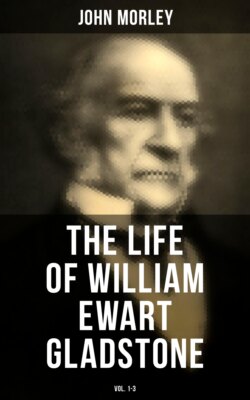Читать книгу The Life of William Ewart Gladstone (Vol. 1-3) - John Morley - Страница 66
На сайте Литреса книга снята с продажи.
V
ОглавлениеFrom 1841 to 1844 Mr. Gladstone's department was engaged in other matters lying beyond the main stream of effort. 'We were anxiously and eagerly endeavouring to make tariff treaties with many foreign countries. Austria, I think, may have been included, but I recollect especially France, Prussia, Portugal, and I believe Spain. And the state of our tariff, even after the law of 1842, was then such as to supply us with plenty of material for liberal offers. Notwithstanding this, we failed in every case. I doubt whether we advanced the cause of free trade by a single inch.'
The question of the prohibition against the export of machinery came before him. The custom-house authorities pronounced it ineffective, and recommended its removal. A parliamentary committee in 1841 had reported in favour of entire freedom. The machine makers, of course, were active, and the general manufacturers of the country, excepting the Nottingham lace makers and the flax-spinners of the north of Ireland, had become neutral. Only a very limited portion of the trade was any longer subject to restriction, and Mr. Gladstone, after due consultation with superior ministers, proposed a bill for removing the prohibition altogether.165 He also brought in a bill (April 1844) for the regulation of companies. It was when he was president of the board of trade that the first Telegraph Act was passed. 'I was well aware,' he wrote, 'of the advantage of taking them into the hands of the government, but I was engaged in a plan which contemplated the ultimate acquisition of the railways by the public, and which was much opposed by the railway companies, so that to have attempted taking the telegraphs would have been hopeless. The bill was passed, but the executive machinery two years afterwards broke down.'
RAILWAYS
Questions that do not fall within the contentions of party usually cut a meagre figure on the page of the historian, and the railway policy of this decade is one of those questions. It was settled without much careful deliberation or foresight, and may be said in the main to have shaped itself. At the time when Mr. Gladstone presided over the department of trade, an immense extension of the railway system was seen to be certain, and we may now smile at what then seemed the striking novelty of such a prospect. Mr. Gladstone proposed a select committee on the subject, guided its deliberations, drew its reports, and framed the bill that was founded upon them. He dwelt upon the favour now beginning to be shown to the new roads by the owners of land through which they were to pass, so different from the stubborn resistance that had for long been offered; upon the cheapened cost of construction; upon the growing disposition to employ redundant capital in making railways, instead of running the risks that had made foreign investment so disastrous. It was not long, indeed, before this very disposition led to a mania that was even more widely disastrous than any foreign investment had been since the days of the South Sea bubble. Meanwhile, Mr. Gladstone's Railway Act of 1844, besides a number of working regulations for the day, laid down two principles of the widest range: reserving to the state the full right of intervention in the concerns of the railway companies, and giving to the state the option to purchase a line at the end of a certain term at twenty-five years' purchase of the divisible profits.166
It was during these years of labour under Peel that he first acquired principles of administrative and parliamentary practice that afterwards stood him in good stead: on no account to try to deal with a question before it is ripe; never to go the length of submitting a difference between two departments to the prime minister before the case is exhausted and complete; never to press a proposal forward beyond the particular stage at which it has arrived. Pure commonplaces if we will, but they are not all of them easy to learn. We cannot forget that Peel and Mr. Gladstone were in the strict line of political succession. They were alike in social origin and academic antecedents. They started from the same point of view as to the great organs of national life, the monarchy, the territorial peerage and the commons, the church, the universities. They showed the same clear knowledge that it was not by its decorative parts, or what Burke styled 'solemn plausibilities,' that the community derived its strength; but that it rested for its real foundations on its manufactures, its commerce, and its credit. Even in the lesser things, in reading Sir Robert Peel's letters, those who in later years served under Mr. Gladstone can recognise the school to which he went for the methods, the habits of mind, the practices of business, and even the phrases which he employed when his own time came to assume the direction of public affairs, the surmounting of administrative difficulties, the piloting of complex measures, and the handling of troublesome persons.
